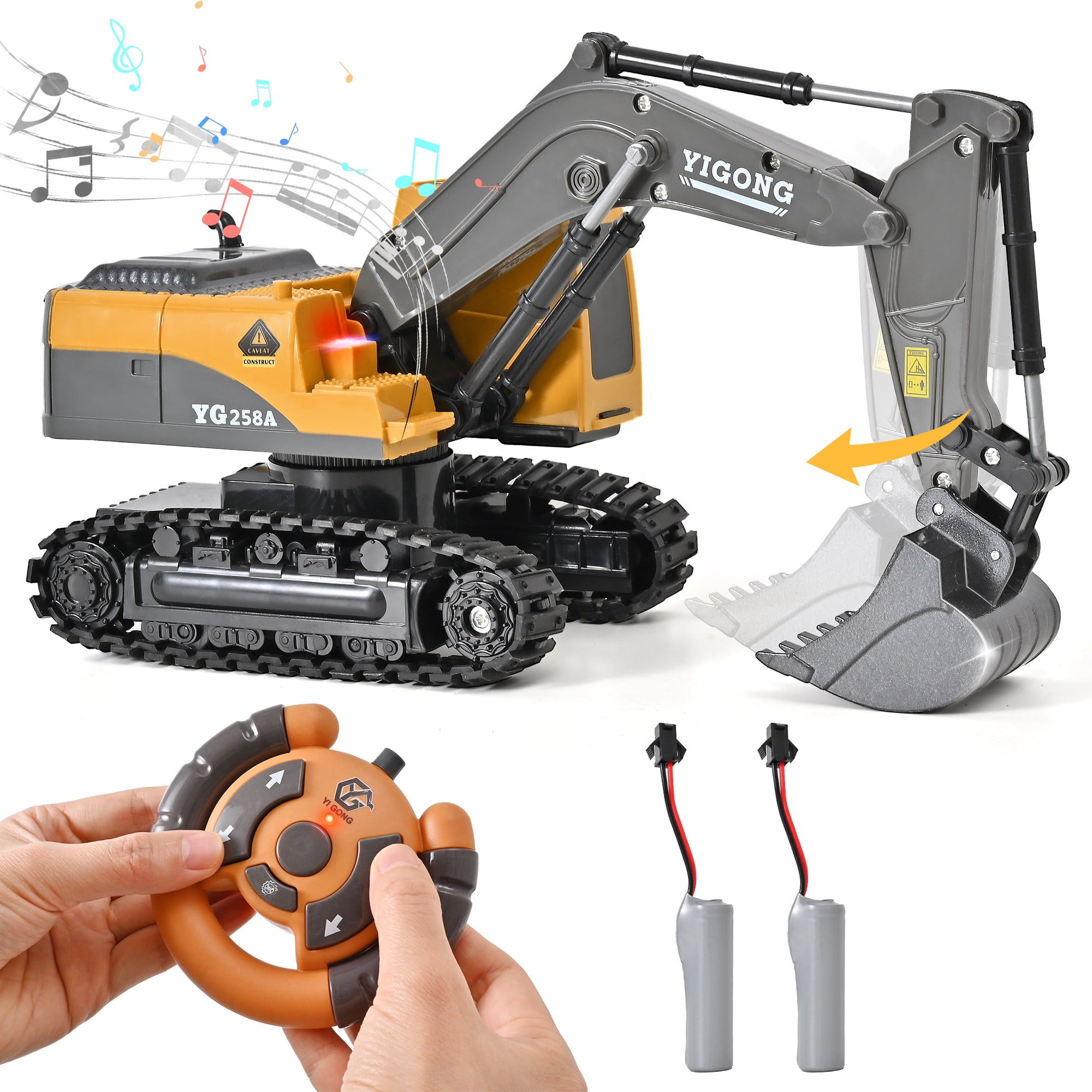Recognizing Just How Excavator Works and Its Effect On Effectiveness
Excavators play a crucial duty in building and construction and mining procedures, depending on a complicated interaction of mechanical and hydraulic systems. Their ability to execute a selection of tasks rests on both their design and the technology incorporated within. Understanding these elements can substantially impact functional performance and efficiency. As developments continue to improve the market, one must take into consideration exactly how these changes will influence future techniques and performance.
The Fundamentals of Excavator Mechanics

The Duty of Hydraulic Solutions in Excavators
At the heart of excavator procedure exists the hydraulic system, which plays a critical function in powering the equipment's functions and motions. This system makes use of pressurized hydraulic fluid to move power, allowing numerous actions such as excavating, swinging, and lifting. By using the principles of hydraulics, excavators can carry out tasks with impressive accuracy and pressure, enhancing overall functional efficiency.The hydraulic system contains vital parts, including shutoffs, cylinders, and pumps, which function with each other to regulate the flow and instructions of the fluid. When the operator engages the controls, the hydraulic fluid is routed to details cyndrical tubes, equating the operator's commands into physical movement. This mechanism enables receptive and smooth actions, which are important in building and construction and excavation atmospheres. double e volvo rc excavator. The performance of the hydraulic system directly impacts the productivity and convenience of the excavator, making it an essential element in contemporary excavation processes
Key Parts of an Excavator
Understanding the key elements of an excavator is vital for understanding how this powerful maker runs. An excavator consists of numerous significant elements, consisting of the undercarriage, house, arm, bucket, and boom. The undercarriage offers stability and flexibility, frequently featuring wheels or tracks to navigate various surfaces. The house contains the engine and hydraulic systems, enabling the driver to control activity and power the machine. The boom prolongs from the residence, making it possible for vertical reach, while the arm links to the pail, promoting digging and training operations.Additionally, the cab houses the driver, geared up with controls for precise maneuvering. Each of these components plays a crucial role in the excavator's general functionality, adding to its efficiency and efficiency on building websites. Recognizing these parts helps in optimizing and preserving excavator efficiency, making certain tasks are completed securely and efficiently.
Add-on Flexibility and Its Advantages
Attachment adaptability is a vital facet of excavators, enabling operators to change in between different devices customized for specific tasks. This versatility not just boosts job effectiveness however additionally adds to cost-effectiveness by decreasing the requirement for multiple machines. Recognizing the different sorts of accessories offered can substantially impact the general efficiency and performance of an excavator on task sites.
Sorts of Add-ons
While excavators are mostly recognized for their excavating abilities, their real versatility hinges on the vast array of add-ons offered. These attachments boost the excavator's functionality, enabling it to execute various tasks past excavation. Typical attachments include containers (for excavating and scooping), hydraulic thumbs (for understanding products), and augers (for drilling holes) Grapples are utilized for dealing with and relocating debris, while rippers can break up tough surfaces. Other specialized add-ons, such as trenchers and plows, make it possible for excavators to adapt to particular work demands. This diversity not just enhances the machine's energy across various industries, consisting of demolition, landscape design, and construction, however additionally enables operators to tailor their tools to satisfy specific project needs effectively.
Increased Task Efficiency
Taking full advantage of task performance is a main benefit of using various excavator accessories. Various attachments permit an excavator to do numerous tasks without needing to change tools, saving useful time and labor. For circumstances, using a hydraulic hammer can break concrete while a pail accessory can dig deep review into soil, allowing a smooth workflow. This convenience decreases downtime linked with equipment modifications and boosts productivity on-site. Additionally, specialized accessories enhance accuracy in jobs such as grading or landscaping, causing better end results. The capacity to adjust to different task needs not only enhances procedures but also minimizes the requirement for extra machinery, guaranteeing that projects are finished promptly and successfully. learn the facts here now Generally, add-on versatility substantially adds to increased task performance in excavation job.
Cost-Effectiveness and Adaptability
Cost-effectiveness is a substantial advantage of utilizing versatile excavator add-ons. These attachments permit a solitary excavator to do numerous tasks, decreasing the need for added equipment and labor - double e volvo rc excavator. By changing between pails, hammers, and grapples, operators can deal with various tasks, from excavating to demolition, consequently taking full advantage of devices usage. This adaptability not just lowers functional costs but also decreases downtime related to transforming tools. In addition, the capability to customize excavators with specialized attachments boosts efficiency, as they can successfully manage diverse tasks according to task demands. To conclude, the mix of cost-effectiveness and adaptability in excavator accessories contributes to boosted functional performance and resource allocation in building and construction and excavation jobs

Advanced Modern Technology in Modern Excavators
Modern excavators are increasingly equipped with advanced modern technology that transforms excavation procedures. Automation enhances operations, while enhanced fuel performance minimizes operational costs. In addition, wise control systems enhance precision and safety and security, noting a considerable advancement in excavation devices.
Automation in Excavation Processes
As excavation innovation evolves, automation has actually become a vital component in boosting effectiveness and accuracy on task sites. Modern excavators are furnished with advanced automated systems that promote jobs such as grading, digging, and trenching with marginal operator treatment. These systems make use of sensors, GPS, and machine discovering algorithms to ensure accurate placing and deepness control, significantly reducing the margin for error. In addition, automation enables drivers to concentrate on calculated decision-making rather than manual controls, causing boosted efficiency generally. Such developments not just improve process but likewise boost safety by reducing human error in complicated operations. The combination of automation in excavation processes represents a significant development in building modern technology, driving the industry towards higher performance and performance.
Enhanced Fuel Efficiency
Advancements in innovation have actually also brought about significant enhancements in gas performance for modern excavators. Modern makers are furnished with sophisticated engines that enhance power result while lowering fuel usage. These engines use ingenious combustion modern technologies, such as turbocharging and straight gas shot, to boost efficiency and efficiency. Additionally, lightweight materials in construction reduce total weight, enabling much less energy expenditure during operation. The introduction of variable rate controls makes it possible for drivers to change engine performance according to details jobs, better decreasing fuel use. Because of this, these improvements not only reduced functional expenses but also add to ecological sustainability by decreasing emissions. On the whole, improved fuel efficiency in excavators is an essential development that strengthens efficiency and financial viability in the building and construction market.
Smart Control Systems
While drivers navigate significantly intricate task websites, clever control systems in excavators have actually become crucial tools for boosting effectiveness and accuracy. These innovative innovations utilize algorithms and sensing units to keep track of numerous parameters such as tons weight, surface conditions, and functional performance. By instantly readjusting hydraulic features, smart systems optimize maker performance, bring about enhanced productivity and lowered wear on components. In addition, operators profit from intuitive interfaces that supply real-time responses and diagnostics, allowing for notified decision-making. This assimilation of modern technology not only simplifies operations however additionally reduces human mistake, adding to much safer workplace. As the construction sector continues to advance, wise control systems will certainly play a vital function in forming the future of excavator performance and effectiveness.
Enhancing Functional Effectiveness With Excavators
Excavators play an essential function in boosting functional efficiency across numerous building and construction and excavation projects. Their versatility enables for numerous tasks, consisting of lifting, product, and excavating handling, which streamlines workflows and reduces the need for added tools. With effective hydraulic systems, excavators can do durable tasks with precision, considerably decreasing the time required to full tasks. The integration of advanced modern technology, such as general practitioner and automated controls, additionally enhances their operation, allowing operators to achieve better precision and decrease website here material waste. In addition, modern-day excavators are created to take in less fuel and decrease exhausts, contributing to both cost financial savings and environmental sustainability. By utilizing excavators effectively, building and construction teams can improve performance, fulfill job due dates, and enhance overall website management. This multifunctionality and performance make excavators crucial devices in the modern building and construction landscape.
The Future of Excavators in Building and Mining Industries
As the construction and mining sectors develop, the future of excavators is positioned for considerable makeover driven by technological innovation and altering operational demands. Advances in automation and fabricated intelligence are improving excavator capabilities, permitting improved accuracy and performance in procedures. Self-governing excavators are arising, decreasing the demand for human intervention and lessening the danger of accidents.Moreover, the integration of telematics and IoT innovation enables real-time surveillance of device efficiency and anticipating maintenance, enhancing uptime. Environment-friendly styles, including hybrid and electric designs, are obtaining traction, lining up with sustainability objectives within the industry.Additionally, using advanced products and lighter styles enhances fuel effectiveness while maintaining performance requirements. As these fads development, excavators will certainly play a crucial role in fulfilling the boosting demands for productivity and security in building and construction and mining, inevitably transforming operational landscapes.
Frequently Asked Concerns
How Do Weather Affect Excavator Performance?

Weather problems significantly affect excavator efficiency, as rain and mud can impede traction and stability, while severe temperature levels might impact hydraulic systems. Operators must adjust to these variables to guarantee perfect capability and safety and security during procedures.
What Precaution Should Operators Comply With While Using Excavators?
Security steps for excavator operators consist of using ideal personal safety tools, performing pre-operation examinations, making sure appropriate communication with ground employees, maintaining a safe distance from above risks, and sticking to well established operational methods to stop accidents.
Exactly How Frequently Should Excavators Be Maintained for Optimum Efficiency?
Excavators ought to be kept on a regular basis to assure peak efficiency, usually every 250 operating hours or as specified by the supplier. Regular checks enhance dependability, stop unexpected break downs, and expand the life-span of the equipment.
What Is the Typical Life-span of an Excavator?
The average life expectancy of an excavator normally varies from 10,000 to 15,000 hours of operation. Aspects affecting longevity consist of upkeep practices, operating problems, and the quality of the device itself, affecting general performance and performance.

Can Excavators Operate Unequal Surface Properly?
Excavators can operate efficiently on irregular surface due to their verbalized styles and flexible tracks. These attributes permit them to maintain stability and traction, allowing effective procedure in tough environments typically come across in building and construction and landscape design tasks. Each of these components plays a crucial function in the excavator's total capability, adding to its performance and effectiveness on building websites. Taking full advantage of work efficiency is a main benefit of utilizing various excavator accessories. While drivers browse significantly complex job websites, wise control systems in excavators have arised as important tools for enhancing effectiveness and accuracy. Excavators play an essential role in improving operational performance across different building and construction and excavation projects. Advances in automation and man-made knowledge are improving excavator capabilities, enabling for improved precision and effectiveness in operations.
Comments on “How a rc excavator Can Speed Up Earthmoving and Site Prep on Your Project”